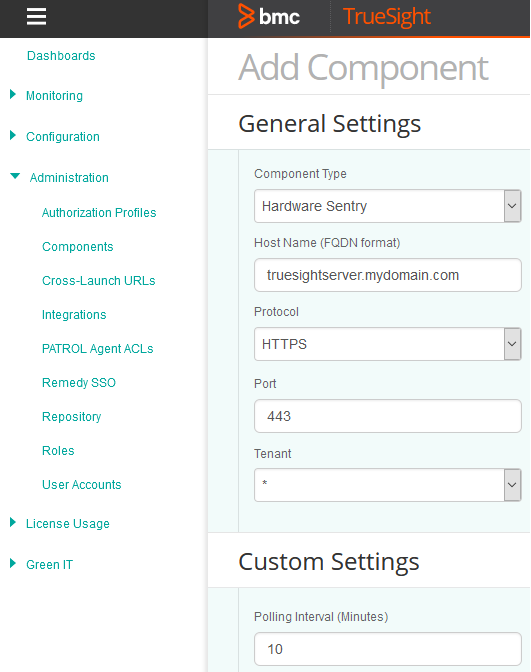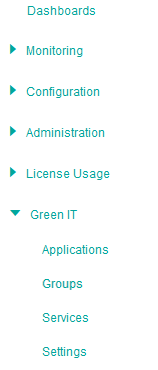-
Home
- TrueSight Green IT Extension 6
Install the TSPS Component
This chapter explains the procedure to follow for installing, uninstalling, and upgrading the Hardware Sentry KM TSPS Component. It also lists the prerequisites and packages required to operate Hardware Sentry KM within the TrueSight Presentation Server (TSPS) environment.
Requirements
Before installing the TSPS Component, make sure that the following requirements are met.
- Version 11.0 or higher of TrueSight Presentation Server (TSPS) and TrueSight Infrastructure Management (TSIM).
- PATROL Agents running Hardware Sentry KM must be connected to TrueSight Infrastructure Management.
- The TrueSight Infrastructure Management components must be correctly configured and running in TrueSight Presentation Server to ensure that hardware devices are fully discovered.
Once all the required steps are completed, you can proceed with the installation.
Installation
The Hardware Sentry KM TSPS Component must be installed on the TrueSight Presentation Server (TSPS). For example, you can copy the installation file hardware-sentry-tsps-plugin-11.4.03.zip to a temporary location on the TSPS server itself (such as /tmp in the example below).
Open a shell as the tsps user on the TSPS server.
If you:
-
install the TSPS Component for the first time, execute the below command in the
/opt/bmc/TrueSightPServer/truesightpserver/bindirectory:$ ./tssh componenttype add /tmp/hardware-sentry-tsps-plugin-11.4.03.zip -
are updating the TSPS Component (i.e. it has already been installed on this TSPS server), run:
$ ./tssh componenttype update /tmp/hardware-sentry-tsps-plugin-11.4.03.zip
TSPS should restart automatically:
+-------------------------------------------------------------------------------------------+
| BMC TrueSight Presentation Server - Command Line Interface 2018 version 11.3.01 |
| Copyright 2014-2018. BMC Software, Inc. as an unpublished work. All rights reserved. |
+-------------------------------------------------------------------------------------------+
Extracting the zip content
target - /opt/bmc/TrueSightPServer/truesightpserver/bin/../componenttypes/hardware-sentry-tsps-plugin_20191013_002522
Replacing jar - /opt/bmc/TrueSightPServer/truesightpserver/bin/../componenttypes/hardware-sentry-tsps-plugin/lib/hardware-sentry-rest-gateway.jar
Replacing jar - /opt/bmc/TrueSightPServer/truesightpserver/bin/../componenttypes/hardware-sentry-tsps-plugin/lib/hardware-sentry-tsps-core.jar
Removed folder - /opt/bmc/TrueSightPServer/truesightpserver/bin/../modules/tomcat/webapps/hardware-sentry-tsps-web
Copying war - /opt/bmc/TrueSightPServer/truesightpserver/bin/../componenttypes/hardware-sentry-tsps-plugin/app/hardware-sentry-tsps-web.war
Backup logback file - /opt/bmc/TrueSightPServer/truesightpserver/bin/../conf/logback/logback_hardware-sentry.xml_bak
Copying logback file - /opt/bmc/TrueSightPServer/truesightpserver/bin/../componenttypes/hardware-sentry-tsps-plugin/conf/logback_hardware-sentry.xml
Calling Database Schemas
Update Supported Plugin: /opt/bmc/TrueSightPServer/truesightpserver/bin/../componenttypes/hardware-sentry-tsps-plugin
Supported plugin directory:hardware-sentry-tsps-plugin
Restarting the server
Checking system requirements
Updated component type successfully.
Configuration
- Connect to the TrueSight Presentation Server interface as a Solution Administrator (typically, with the admin account).
- Navigate to Administration > Components and add a new Component.

If the TSPS Component was successfully installed, Hardware Sentry KM should appear in the Component Types pull-down list. Select it and enter the following information:
| Property | Description |
|---|---|
| Host Name (FQDN Format) | The FQDN host name. Note that the host name does not impact the Hardware Sentry component behavior. |
| Port | The TSPS port to which you are connected (Default: 443). |
| Protocol | HTTPS. |
| Tenant | * (mandatory, do not select another tenant). |
| Polling Interval | The frequency at which the TPSP component polls the PATROL Agent to collect metrics (Default: 10 minutes). |
You will need to refresh the page in your browser for the Hardware Sentry KM UI elements to be loaded in the TrueSight Presentation Server interface: Applications, Groups, Services, and Settings.

Troubleshooting
All operations of the Hardware Sentry KM TSPS Component are logged in a standard TrueSight Presentation Server log file: hardware-sentry.log, located in the /opt/bmc/TrueSightPServer/truesightpserver/logs (default location on Linux ).
There is no specific debug mode to enable; any problem or exception is logged in hardware-sentry.log by default.
A failure to access Hardware Sentry KM interface through TSPS is most likely caused by a problem with the user permissions. In case of doubt, always try to reproduce the problem with a Solution Administrator account (i.e. the admin account in most cases).
Any communication or synchronization issue between TrueSight Presentation Server and PATROL Agents will cause errors or response delays in the user interface.
Issue with TrueSight Presentation Server 11.3.03 Upgrade
Upgrading TrueSight Presentation Server to version 11.3.03 while the Hardware Sentry KM TSPS Component is already installed and configured in your environment can prevent it from loading properly in TrueSight. As a result:
- The TrueSight interface no longer displays links to Hardware Sentry KM
- The Component page no longer lists Hardware Sentry KM
This problem occurs because the upgrade script modifies the /opt/bmc/TrueSightPServer/truesightpserver/conf/custom/csr.conf configuration file, overriding the Hardware Sentry KM TSPS Component's default entries in /opt/bmc/TrueSightPServer/truesightpserver/conf/services/csr.conf.
To fix the problem:
-
Edit the /opt/bmc/TrueSightPServer/truesightpserver/conf/services/csr.conf and locate the following line:
vm.args.classpath.282="${truesight.home}/lib/hardware-sentry-tsps-rest-api.jar"Note: The numbers may vary depending on your environment.
-
Replace the entry number (282 in the above example) with a number that is not listed in either this files (./conf/services/csr.conf) and ./conf/custom/csr.conf. In a typical setup, replacing 282 with 287 will work:
vm.args.classpath.287="${truesight.home}/lib/hardware-sentry-rest-gateway.jar" -
Then restart TrueSight Presentation Server with the below commands:
$ ./tssh server stop $ ./tssh server start
Everything should work as expected after the restart and a refresh of the TrueSight interface in your browser.
Handling backslashes in object IDs
Some KMs, such as BMC's Windows KM and Microsoft SQL Server KM, use backslashes (\) in object IDs for certain classes. When accessing these objects in Hardware Sentry KM via a web browser or the REST API, the URL includes the object path, which may contain backslashes.
By default, Apache Tomcat—the Web server and Application Server behind TrueSight Presentation Server—blocks backslashes in URLs. As a result, attempting to access a monitored object with a backslash in Hardware Sentry KM through TSPS will result in an (HTTP/400 Bad Request).
To solve this problem, you need to modify Apache Tomcat’s configuration to permit backslashes in URLs:
-
Edit the ./conf/custom/csr.conf file in your TSPS installation directory
-
Add the following lines:
# Allow backslashes vm.args.system.501=-Dorg.apache.catalina.connector.CoyoteAdapter.ALLOW_BACKSLASH=true vm.args.system.502=-Dorg.apache.tomcat.util.buf.UDecoder.ALLOW_ENCODED_SLASH=trueNote: If there is already a
vm.args.system.501orvm.args.system.502entry, use the next numbers in sequence. -
Run the below command to restart TrueSight Presentation Server:
$ ./tssh server stop $ ./tssh server start
Removal and Un-installation
There is no true removal procedure for a Component Type. However, you can unload all UI elements of Hardware Sentry KM by deleting the corresponding Component instance.
Connect to the TrueSight Presentation Server interface as a Solution Administrator (typically, the admin account). Navigate to Administration > Components and Delete the Hardware Sentry component.
You will need to refresh the page in your browser for the Hardware Sentry KM UI elements to be unloaded in the TrueSight Presentation Server interface.
High-Availability (HA) Environment
HA Installation
In a clustered environment, the installation of the Hardware Sentry KM TSPS Component must be performed on each TrueSight Presentation Server (TSPS) node. The configuration however needs to be done only on the active node.
The below procedure is therefore recommended:
-
Install the Component on the standby node (B), following the above installation procedure.
-
Wait for this TSPS node (B) to restart and be back in standby status. Do not proceed with the next step until TSPS is ready on the standby node (B).
-
Install the Component on the active node (A), with the same procedure.
This will trigger a restart of TSPS, and potentially a failover of the cluster (where node B takes over and becomes the active node).
-
Wait for the cluster to be back online. This may take several minutes. Be patient.
-
Connect to the TSPS interface, using the cluster address, and configure the Component, following the regular procedure.
-
Optionally, trigger a failover of the cluster by running a
tssh server starton the active node.Once the cluster is back online, verify that the Hardware Sentry TSPS Component is still properly listed as Connected in Administration > Components.
This optional step simply verifies that the failover mechanism will work safely for Hardware Sentry KM.
To determine the exact hostnames and the status of each node in your clustered TSPS, you can run the below command on either node:
[tsps@dev-tsps-ha-1 bin]$ ./tssh ha status
+--------------------------------------------------------------------------------------------+
| BMC TrueSight Presentation Server - Command Line Interface 2020 version 11.3.04 |
| Copyright 2014-2020. BMC Software, Inc. as an unpublished work. All rights reserved. |
+--------------------------------------------------------------------------------------------+
Real-time Stats details
==============================
Node State :> Active
Active since :> Dec 7, 2020 6:15:00 PM
Primary node details
------------------------------
TSPS FQDN :> dev-tsps-ha-1.internal.sentrysoftware.net
Cache replication port :> 7800
Control port :> 8800
Secondary node details
------------------------------
TSPS FQDN :> dev-tsps-ha-2.internal.sentrysoftware.net
Cache replication port :> 7800
Control port :> 8800
Load Balancer
------------------------------
FQDN :> dev-tsps-ha.internal.sentrysoftware.net
HA Upgrade
Similarly, the upgrade of the Hardware Sentry KM TSPS Component must be performed on each node:
-
Upgrade on the standby node with
tssh componenttype update. -
Wait for TSPS to restart and be back in standby status. Do not proceed with the next step until TSPS is ready on the standby node.
-
Upgrade on the active node with the same procedure.
Note: This will trigger a restart of TSPS, and potentially a failover of the cluster. This may take several minutes. Be patient.
Upgrades do not require to re-configure the TSPS Component.
HA Removal
The removal of the Hardware Sentry KM TSPS Component in a clustered environment is a bit trickier. Follow the below procedure carefully:
-
Delete the Hardware Sentry Component through Administration > Components in the TrueSight interface.
- If the component is immediately deleted, you can skip to the 4th step.
- If the component remains in the Deleting state, proceed with the next step.
-
Restart the active node with
tssh server start.This will trigger a failover of the cluster and will synchronize the TSPS configuration from the active node to the standby node.
-
Wait for the cluster to be back online. This may take several minutes. Again, be patient.
-
Refresh your browser, and verify in the Administration > Components interface that the Hardware Sentry TSPS Component is no longer listed.
During the removal procedure, you may experience a blank screen issue when you refresh your browser (the TrueSight interface doesn't load). This is caused by the intermediary state of the cluster. The restart of the active node should solve the issue.